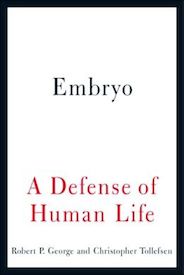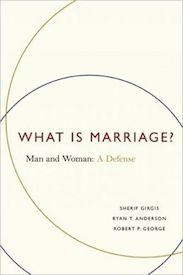Embryo: A Defense of Human Life
The bitter national debate over the uses of human embryos for scientific research and medical treatments has raised some troubling questions: Is it morally permissible to produce and experiment upon human embryos? Is it morally permissible to destroy human embryos to obtain stem cells for therapeutic purposes? Is it morally permissible to treat human embryos as disposable research material that may be used and destroyed to benefit others? All such questions have the seeds of their answers in one, more fundamental question: Are all human embryos human persons worthy of full moral respect? In “Embryo: A Defense of Human Life,” Robert P. George and Christopher Tollefsen answer that question with a resounding “Yes.”
Deliberately avoiding religious arguments, Professors George and Tollefsen make a purely scientific and philosophical case that the fetus, from the instant of conception, is a human being, with all the moral and political rights inherent in that status — and that, as such, any research that destroys a viable embryo represents the unacceptable taking of a human life. They also grapple with the political, scientific, and cultural consequences arising from their position and offer a summary of scientific alternatives to embryonic stem cell research.
A few of the revealing facts and persuasive arguments you’ll find in this important book:
- Powerful and abundant scientific evidence confounding the denial that the early embryo is a human being
- Refuted: the claim made by some supporters off embryo-destructive research that because early-stage embryos can split into identical twins, they are not yet individuals or determinate human beings
- Why all human beings — including those at the earliest stages of development — are “persons” deserving of full moral respect
- Why the right not to be intentionally killed is inherent in the fact of being a human being — and why that status begins at the moment of conception
- Why a human being does not, as some argue, have to have attained or acquired some quality or feature (such as a certain degree of consciousness) that is the touchstone of full moral worth
- Exposed: the logical, philosophical and scientific errors in the “moral dualism” that regards being a “person” as merely a stage in a human life span
- Why an embryo does not exist in a “prepersonal” stage that does not merit the inviolable rights otherwise ascribed to persons
- Why, just as no human being should be excluded from moral and legal protections based on race, sex, religion, or ethnicity, none should be excluded on the basis of age, size, or stage of biological development
- What’s wrong with the argument that since “spare” embryos left over from fertility treatments are destined to be destroyed anyway, it’s better to make use of them for the greater good than to let them go to waste
- Why, in the end, it is morally impermissible to engage in any research, for any purpose, that involves the destruction of human beings at any stage of their lives on in any condition, however weak or dependent
- The Author

Robert P. George
Professor George holds the McCormick Chair in Jurisprudence at Princeton University, and he is the founding director of the James Madison […] More about Robert P. George.
- Books by the Author
















